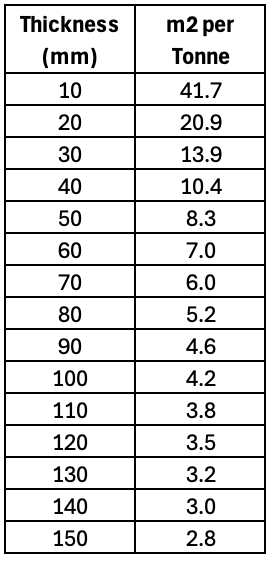HOW TO CALCULATE HOW MANY TONNES OF ASPHALT REQUIRED...
WHETHER YOU ARE PATCHING A ROAD, LAYING A NEW DRIVEWAY OR BUILDING A MOTORWAY, THERE IS A COMMON APPROACH TO CALCULATING THE QUANTITY OF MATERIAL YOU NEED.
Asphalt, also known as tarmac or macadam, is an expensive product and not one you would want to over or under order whilst doing a project.
If you are using EZ Street Asphalt you can purchase in either bags, bulk sacks or in tonnes. For quick and easy help quantifying this, use our handy calculator below.
If you are using hot tarmac then you will most likely be purchasing in tonnes which is a metric measurement equal to 1000kg. 'Tons' is an imperial measurement which is typically used in the USA and equal to 1,016kg or 2,240lbs. This blog post will focus on calculating the weight required in Tonnes (1000kg) which is most commonly used in Europe.
So how do you calculate the quantity?
First of all lets look at the simple part, you need to know three key measurements;
- Length being the length of the road or patch you need to lay asphalt in
- Breadth being the width of the road or patch you need to lay asphalt in
- Depth being the depth of the specified road thickness or patch depth
Multiplying the length by the breadth will give you the number of square metres required (m2).
Therefore multiplying the m2 of surface area by the depth will provide you with the total cubic metres of asphalt required.
Lets look at a quick worked example of this;
Road Patch Size
10m Long (Length) x 2m Wide (Breadth) x 80mm (0.08m) deep (depth)
10m x 2m = 20m2
20m2 x 0.08m = 1.6m3
Now the more complicated part....
The next part of the calculation is a little more complicated as it can vary depending on the density of the stone used in the asphalt production. You will read some people quoting a range of density in asphalt of 2200kg to 2700kg per cubic metre. The actual density of asphalt is determined by the mix design, the source rock density and the geology of the stone used.
It is common for surfacing crews to work on a density of 2.4 tonnes per cubic metre (2400kg/m3).
This means that a simple way to now calculate the number of tonnes of asphalt required is to multiply the cubic metres volume by 2.4.
In our worked example above, it would look like
1.6m3 x 2.4 = 3.84 tonnes,
It is most likely that the hot mix asphalt plant would produce asphalt in minimum 1 tonne batches, therefore the purchase quantity would be 4 tonnes.
There is however an alternative way to calculate the quantity, which is particularly useful when various layers are required and in different materials. This involves calculating the quantity using what some in the industry will describe as 'covers or superage', which is using the m2 per tonne based on a layer thickness.
The Table below gives an example of what these 'covers' or 'superage' may look like based on 2.4m3/t density.

Using this table for the worked example of an 80mm thick layer at 2.4 t/m3 density would look like
20m2 / 5.2 = 3.84 tonnes
If you are in any doubt about the density of asphalt in your local area, call your local asphalt plant and ask. The density of asphalt is important as it has an impact on the overall cost of your project, a highly dense material will require more tonnes to complete the same surface area compared to a low density product.
You can use the known density to calculate the m3 cost of asphalt to do a proper comparison. As an example...
Plant One offering a Dense Surface Course at £140 per tonne with a density of 2.4 will give £336/m3
Plant Two offering a Dense Surface Course at £135 per tonne with a density of 2.7 will mean a cost of £365/m3
This shows that despite the cost per tonne being £5 per tonne less, the actual project cost in our worked example of 1.6m3 would be £584 compared to £537.60, meaning Plant Two would actually be £46.40 cheaper.
EZ Street Cold Asphalt, used for permanent repairs, has a unique mix of constituent materials using polymer additives, which yields a low density, closer to 2.15m3 per tonne.
For help or assistance with any other asphalt surfacing products or services, get in touch with our sales team.
A note on density....
Density is a measure of how much mass is contained in a given volume. It is typically measured in units of mass per unit volume, such as kilograms per cubic metre (kg/m3). The formula for density is:
density = mass / volume
Density is an intensive property, which means it does not depend on the amount of the substance present. A substance with a higher density has more mass packed into the same volume, while a substance with a lower density has less mass in the same volume. For example, a block of steel and a block of wood may have the same volume, but the steel block will weigh more because steel has a higher density than wood. This property is important in many fields like materials science, physics, chemistry, geology and so on.



